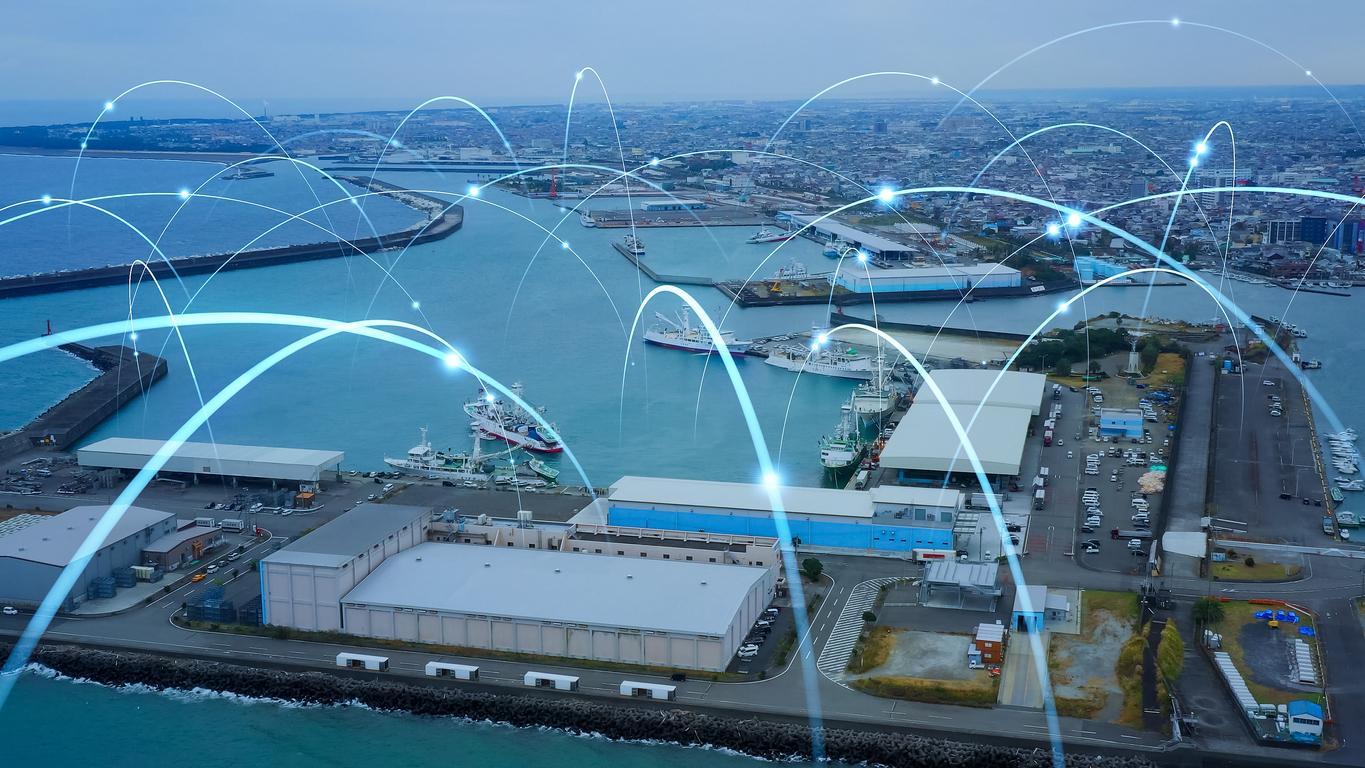The development of new technology like artificial intelligence (AI) has revolutionized most businesses, including logistics. Innovations that are now the standard include intelligent roads, autonomous cars, predictive analytics, and industrial automation.
Companies are starting to see the benefits of machine learning and the advantages of utilizing the knowledge of AI providers to enhance delivery and production. Because of this, we’ve decided to research and share all there is to know about AI in logistics.
Role of Artificial Intelligence and Machine Learning in Logistics
Logistics is not an exception to the growing influence of AI and machine learning across many businesses and facets of our life. When it comes to the supply chain industry, AI and machine learning can be quite useful since they can optimize operations, prevent mistakes made by humans, save time, and forecast possibilities and issues in the future.
By making supply chain management a more fluid operation, AI has begun to have an impact on the logistics sector. It is currently a crucial component of every business’s future software system.
Role of AI in Logistics
With cognitive automation, AI is crucial for time savings, cost savings, productivity gains, and accuracy improvement. Because it automates several time-consuming tasks and aids in demand forecasting, AI enables us to save time and money.
AI can assist in logistics route optimization, which lowers shipping costs and ultimately helps to increase profitability. Artificially intelligent devices can quickly and accurately acquire and analyze data to make judgments, saving time for humans.
By gathering and analyzing data or processing inventory, AI contributes to a radical transformation of warehouse operations. For example, robots are already often utilized inside warehouses to transport, track, and find inventory. Players in the logistics industry can use data platforms and datasets generated through AI to control trends and anomalies.
Role of Machine Learning in Logistics
Machine learning is used to find patterns in supply chain data by relying on algorithms that can quickly identify the most important influencing factors.
Because of its algorithm and the logistics firms employing it, demand forecasting accuracy can be improved by quickly analyzing vast, diversified data sets. In the coordinated supply chain and logistics sector, machine learning helps to lower freight costs, increase vendor delivery performance, and decrease supplier risk.
Uses of AI in the Logistics Industry
Artificial intelligence has changed the logistics business for good. Here are eight ways that AI-driven technology might assist businesses in reimagining and enhancing their logistics.
1. Advanced Warehouses
All warehouse processes, from data collection to inventory management, are transformed by AI. With the use of this technology, efficiency may be improved and profits can rise. The product sorting and packing processes have already been automated by several logistics companies. Products are sorted and packed by robots according to delivery specifications.
Additionally, AI makes it possible to manage and complete several everyday duties. New technology will also make it easier to handle quality control without personnel oversight. Moreover, AI will give the company the chance to communicate with its warehouses, whether it has one or many, to determine the best way to move the product.
2. Robotics
Robotics is a phrase used to describe the use of intelligent machines in supply chain management. Routine jobs including distribution, transportation, warehousing, sorting, packaging, and routing can generally be performed by robots.
The ability of AI-assisted industrial robots to complete increasingly complicated tasks autonomously sets them apart from traditional industrial robots. Intelligent robots can advance by taking on new tasks and performing challenging tasks.
As a result, the distribution process will become more successful, foreseeable, and controlled as a result of the equipment’s ability to partially replace people in the process.
3. Back Office Automation
The importance of back-office operations cannot be understated when discussing AI in logistics. The use of AI and Robotic Process Automation (RPA) drastically improves work quality and takes over all of those tedious, repetitive tasks.
Supply chains have automated back-office activities, allowing for greater precision and cost savings. The newest technology that moves two steps forward is cognitive automation. Businesses benefit from the time and money savings, increased productivity, and precision.
Great Job Moving‘s operations department got a 30-40% boost in long-distance delivery planning efficiency by using the logistics software developed by Achievion. Route dispatcher now spends way less time looking for the best routes and instead focuses on quality shipment delivery execution.
In essence, robots take the role of office workers. Many people do not use this technology because they believe that software robots would eventually replace human employees. However, these machines will reduce costs and do away with human errors.
4. Self-Driving Vehicles
Autonomous or self-driving automobiles have the potential to greatly improve distribution efficiency. By autonomously moving goods from factories, retail stores, and distribution hubs to their destinations, self-driving automobiles will save delivery times and shipping costs.
They also increase data collection, exchange, and integration to guarantee an optimum operating system. By removing transportation obstacles and difficulties, this technology will boost the effectiveness of the distribution process.
5. Big Data
Like any other sector, logistics produces a lot of data. Data administration will become increasingly difficult without a properly maintained system. By synchronizing data from numerous sources, including drivers’ apps, gadgets, and systems, and examining how various factors affect logistics operations, companies can save money and prevent late shipments and deliveries.
Organizations may take into consideration factors like fleet maintenance schedules, automotive sensors, bad weather, and fuel prices using AI-driven data analytics. It allows companies to lower their logistics costs by providing drivers with crucial data points that help them move more efficiently.
6. Customer Experience
The number of stock items required should be known to and anticipated by businesses. If there is a shortage of inventory but a high level of demand, the company will suffer significant losses.
By utilizing AI algorithms, artificial intelligence can help you predict trends. Numerous studies have shown that AI predicts more accurately than the majority of human specialists.
The accuracy of demand prediction is increased as a result of AI monitoring and measuring all necessary parameters. The administration of warehouses is made easier by this data. AI can also enhance the client experience positively.
Integrating this technology involves tailoring the customer experience, which boosts customer loyalty. The partnership between DHL Parcel and Amazon is a fantastic illustration of tailored customer service.
7. Smart Roads
Some companies are working to create smart roadways. Solar panels and LED lights were used in the construction of some of these roads. In addition to using lights to alert drivers to critical changes in road conditions, these highways are capable of producing electricity. Additionally, the solar panels are heated to avoid the wintertime ice on the road. As a consequence, the logistics sector benefits because there are no supply chain delays brought on by bad weather.
8. Voice Assistants
In the field of logistics, artificial intelligence is also driving voice assistants. One such example that helps customers track their shipments is Amazon’s Alexa. You can easily find out where your shipment has reached by asking Alexa about it.
Additionally, it can direct callers to the courier’s customer service department if the customer is having problems receiving their package. It shows that AI has a role to play at each step of the logistics process.
Benefits of Integrating AI in Logistics
The world of business has expanded across many industries thanks to AI’s advances. AI has revolutionized the supply and demand chain as well as logistics operations. A McKinsey study claims that by 2030, AI will establish a completely new “logistics paradigm” as it continues to outshine humans in monotonous but vital activities.
Solutions for improving logistics technologies are increasingly required due to the unanticipated difficulties in shipping that are currently occurring. AI can provide just that. Let’s explore the top 5 benefits of integrating AI into logistics.
1. Improving Data Quality
The quality of the data that AI helps to establish will always be the main advantage of its use in logistics. AI capabilities like Machine Learning (ML) and Natural Language Processing (NLP) assist in accurately gathering and organizing the enormous amounts of information that go into logistics organizations every day.
AI is more precise than ever thanks to speedier global connections, and when used in logistics, it will allow for the best possible data utilization in shipping.
AI maximizes resources and reduces expenses by avoiding hazards and coming up with more effective solutions. Enriched data may help a business determine where it needs the exact number of people and resources when it needs them, and for how long—even across many locations. This is possible with the support of human-machine synergy.
More knowledge is gathered with increased information integrity and consolidation, and logistics organizations can make necessary adjustments across the board for regular operations in a time of high demand.
2. Better Predictive Analytics
It is almost unthinkable for the human mind to be able to effectively sort through big data, resource estimation, and infrastructure evaluations to determine how to best move a single consignment from point A to point B at any given time.
Not to mention that each procedure takes a lot of time, and when a company gets bigger or during peak periods, the variability of every element only increases.
A solution backed by AI and predictive analytics can help in this situation. By gathering more precise data, AI can carry out all of these logistical operations while also adding even more pertinent external aspects to its information extrapolation. This will improve estimations of future demand and encourage logistics technology businesses to adopt proactivity.
This is demonstrated by the leading provider of international freight, DHL, whose technology keeps track of more than eight million internet and social media posts to spot any possible supply chain issues. The system gathers data from online conversations and recognizes probable material shortages, access problems, and supplier statuses owing to ML and NLP.
3. Improved Transportation Forecasting
By 2035, it is predicted that AI would boost logistics efficiency by more than 40%. With e-commerce booming—up 33 percent to $792 billion in 2021 alone—efficient performance in the demand and supply chain is extremely critical right now.
Today, being able to predict where assets will be needed is a major advantage. Along the logistics system, AI may be connected to numerous databases to gather data on all the pieces and opportunities that are available and to provide a roadmap for increased feasibility.
Up to 12 weeks ahead of time, demand forecasting by asset type and location can be provided by AI-driven software, offering logistics companies the knowledge they need to route trucks and trains more effectively, maximize storage on ocean consignments, and possibly avoid any inefficiencies at ports or areas where production is prone to delays.
4. Accurate Inventory Management
Artificial intelligence-driven technologies have a lot of potential for use in inventory management due to their ability to handle massive amounts of data. Making sure that goods enter and leave a warehouse in the right order can be accomplished with the use of efficient inventory management.
There are many inventory-related factors, including order processing, sorting, and packaging, which can take a long time and be error-prone. Effective inventory control can help prevent overstocking, understocking, and unanticipated stockouts.
5. Optimized Shipping and Delivery
AI monitors traffic, aids in lowering fuel usage, enhances air quality, and facilitates urban planning. In addition, it lowers traffic, shows the driver when they have time to spare, makes parking simple, and many other things.
To find the most practical and cost-effective route for trucks to deliver the goods, businesses can analyze existing paths using route optimization methods and shortest path algorithms. This enables faster shipping, significantly lower shipping costs, and ultimately improves customer experience.
Final Word
Adopting new technologies is one of the best methods for improving your supply chain. The logistics operations in your business can be made more accurate and efficient thanks to artificial intelligence, which also increases cost-effectiveness.
Because it gives you a competitive edge and ushers in a useful and cost-effective transformation, AI is important to include in your logistics operations. Achievion can help you efficiently integrate AI technologies into your logistics function. Get in touch with the team today to know more.









